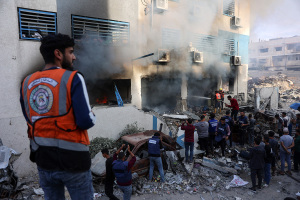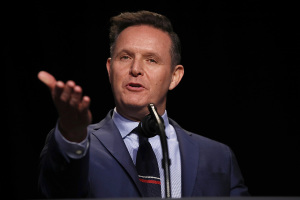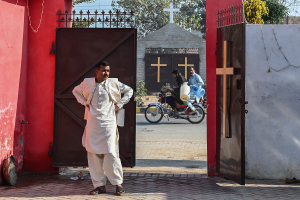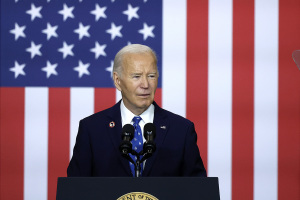Indian Christians Concerned as Hate Campaign Intensifies Ahead of Hindu Event
Indian church activists have expressed deep concern over Hindu nationalists' anti-Christian campaign in the run-up to a major Hindu event next week.
A fact-finding team recently spent three days in the Mandla-Jabalpur region in Madhya Pradesh, central India, where a million people are expected to attend what is called the Narmada Samajik Kumbh, Feb. 10-12.
The team uncovered plans for "ghar wapsi" (homecoming celebration) or conversion of local Christians to Hinduism despite Madhya Pradesh's Freedom of Religion Act which requires prior notice of such actions. They have solid reasons to fear an outbreak of violence against Christians during or after the event.
Christian activist Dr. John Dayal was part of the fact-finding team that gathered evidence, such as pamphlets, posters, banners and hoardings, spreading hate against Christian missionaries.
"We support the freedom of the majority community to hold such a massive religious event. But we fear that even if there is no violence or a forcible conversion of Christians to Hinduism during the Kumbh, the Hindutva campaign will poison the atmosphere in Madhya Pradesh and will negatively impact relationships between Christians and tribals in the hamlets, villages and townships of the region," said Dayal, secretary general of the All India Christian Council.
"The penetration of hard core Hindutva activists in Madhya Pradesh may have a long-term dampening effect on freedom of religion in this region. It may also negatively impact the continuing social work of Christians, including schools and medical centers in under-developed districts," he added.
The fact-finding team has urged the Madhya Pradesh government to take cognizance of the massive hate campaign and to monitor the security of the minorities during the Kumbh.
Some of the expected participants include prominent Hindu religious leaders as well as activists of the RSS, VHP and other Hindu organizations, Chief Ministers of BJP-ruled states, Narendra Modi of Gujarat, Shivraj Singh Chauhan of Madhya Pradesh and Raman Singh of Chhattisgarh.
The fact-finding team, which also included Vijayesh Lal of the Evangelical Fellowship of India, interviewed the Catholic bishop of Jabalpur, the Rev. Gerald Almeida, as well as over 200 Catholic, Protestant, and Evangelical priests, pastors, and church workers from the area. The team also visited the Narmada River, particularly the left bank, where houses and fields were leveled for housing, toilets and other hospitality arrangements.
"Our sources tell us there will be a major ghar wapsi or conversion to Hinduism of local Christians. We urge the administration to take timely action and appropriate steps to protect the citizens and particularly the minorities, their places of worship and institutions and religious personnel. The administration would be entirely and wholly responsible in case of any undesirable eventuality," states a memorandum signed by priests and representatives of the Christian community to the state governor. Copies were also given to the chief minister and the divisional and district authorities.
The memorandum also listed samples of newspaper clippings and the offensive posters targeting minorities.
Different kumbhs are held on various rivers across India. The "Narmada Samajik Kumbh" is distinguished because it is a very recent event invented by the Sangh Parivar – a family of organizations of Hindu nationalists inspired by the RSS – to recruit tribal people in western and central India.





























